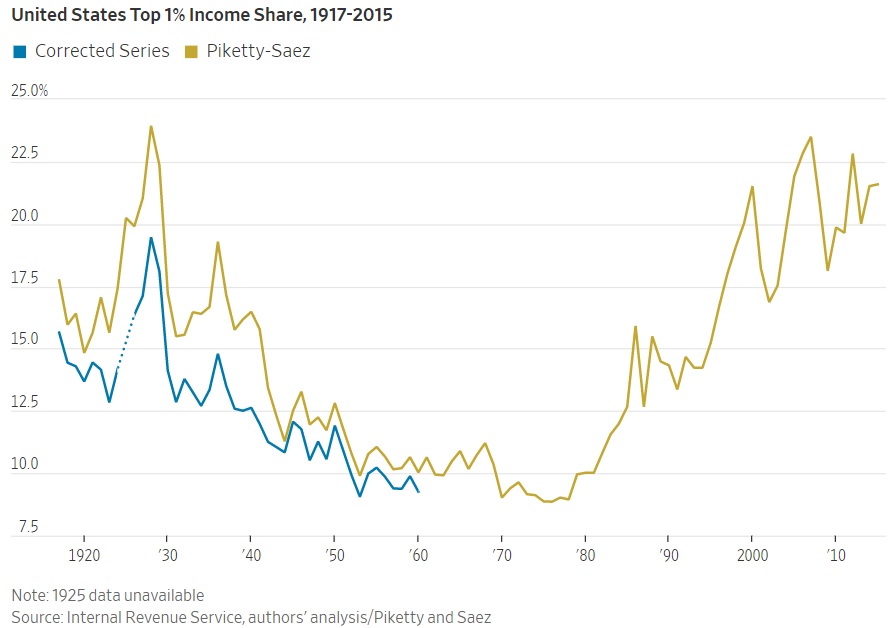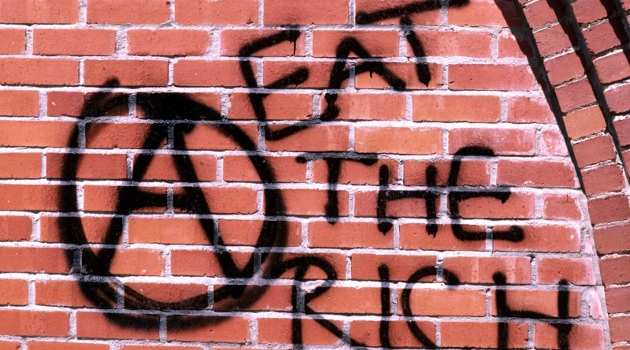Thomas Piketty is a big proponent of class-warfare tax policy because he views inequality as a horrible outcome.
But a soak-the-rich policy agenda, echoed by many other academics such as Emmanuel Saez and Gabriel Zucman, is fundamentally misguided. If people really care about helping the poor, they should focus instead on reforms that actually have a proven track record of reducing poverty.
The fact that they fixate on inequality makes me wonder about their motives.
And it also leads me to find their work largely irrelevant. I don’t care if they produce detailed long-run data on changes in inequality.
I prefer detailed long-run data on changes in poverty.
That being said, it appears that some of Piketty’s data is sloppy.
I shared some evidence about his bad numbers back in 2014. And, in a column for the Wall Street Journal, Phil Magness of the American Institute for Economic Research and Professor Vincent Geloso of George Mason University expose another glaring flaw
…the Piketty-Saez theory is less a matter of history than an accounting error caused by their misunderstanding of World War II-era tax statistics. …It’s true that income inequality declined in the early part of the 20th century, but the cause had more to do with the economic devastation of the Great Depression than the New Deal tax regime. …they failed to account properly for historical changes in how the Internal Revenue Service reported income-tax statistics. As a result, their numbers systematically overstate the levels of top income concentrations by as much as a third …Between 1943 and 1944 the tax collection agency shifted from tracking “net income” to “adjusted gross income,” or AGI…a truer depiction of annual earnings… Yet Messrs. Piketty and Saez didn’t bring pre-1944 IRS records into line with AGI accounting standards. Instead, they applied a fixed and arbitrary adjustment to all years before the AGI accounting change that conveniently scaled upward to the highest income brackets. …They used the wrong accounting definition for personal income and neglected to adjust their data for wartime distortions on tax reporting. When we corrected these problems, something stunning happened. The overall level of top income concentration flattened, and the timing of its leveling shifted away from the World War II-era tax rates that Messrs. Piketty and Saez place at the center of their story.
Here’s a chart that accompanied the column, showing how accurate data changes the story.

Since today’s column debunks sloppy class warfare, let’s travel back to 2014, when Deirdre McCloskey reviewed Pikittey’s tome for the Erasmus Journal of Philosophy and Economics.
She also thought his fixation on envy was misguided.
…in Piketty’s tale the rest of us fall only relatively behind the ravenous capitalists. The focus on relative wealth or income or consumption is one serious problem in the book. …What is worrying Piketty is that the rich might possibly get richer, even though the poor get richer too. His worry, in other words, is purely about difference, about the Gini coefficient, about a vague feeling of envy raised to a theoretical and ethical proposition. …Piketty and much of the left…miss the ethical point…of lifting up the poor…by the dramatic increase in the size of the pie, which has historically brought the poor to 90 or 95 percent of “enough”, as against the 10 or 5 percent attainable by redistribution without enlarging the pie. …the main event of the past two centuries was…the Great Enrichment of the average individual on the planet by a factor of 10 and in rich countries by a factor of 30 or more.
But she also explained that he doesn’t understand how the economy works.
The fundamental technical problem in the book…is that Piketty the economist does not understand supply responses. In keeping with his position as a man of the left, he has a vague and confused idea about how markets work, and especially about how supply responds to higher prices. …Piketty, it would seem, has not read with understanding the theory of supply and demand that he disparages, such as in Smith (one sneering remark on p. 9), Say (ditto, mentioned in a footnote with Smith as optimistic), Bastiat (no mention), Walras (no mention), Menger (no mention), Marshall (no mention), Mises (no mention), Hayek (one footnote citation on another matter), Friedman (pp. 548-549, but only on monetarism, not the price system). He is in short not qualified to sneer at self-regulated markets…, because he has no idea how they work.
And she concludes with a reminder that some of our left-wing friends seem most interested in punishing rich people rather than helping poor people.
The left clerisy such as…Paul Krugman or Thomas Piketty, who are quite sure that they themselves are taking the ethical high road against the wicked selfishness…might on such evidence be considered dubiously ethical. They are obsessed with first-act changes that cannot much help the poor, and often can be shown to damage them, and are obsessed with angry envy at the consumption of the uncharitable rich, of which they personally are often examples, and the ending of which would do very little to improve the position of the poor. They are very willing to stifle through taxing the rich the market-tested betterments which in the long run have gigantically helped the rest of us.
Amen. If you want to know what Deirdre means by “betterment,” click here and watch her video.
P.S. Click here, here, here, and here for my four-part series on poverty and inequality. Though what Deirdre wrote in 2016 may be even better.
P.P.S. I also can’t resist calling attention to the poll of economists at the end of this column.




